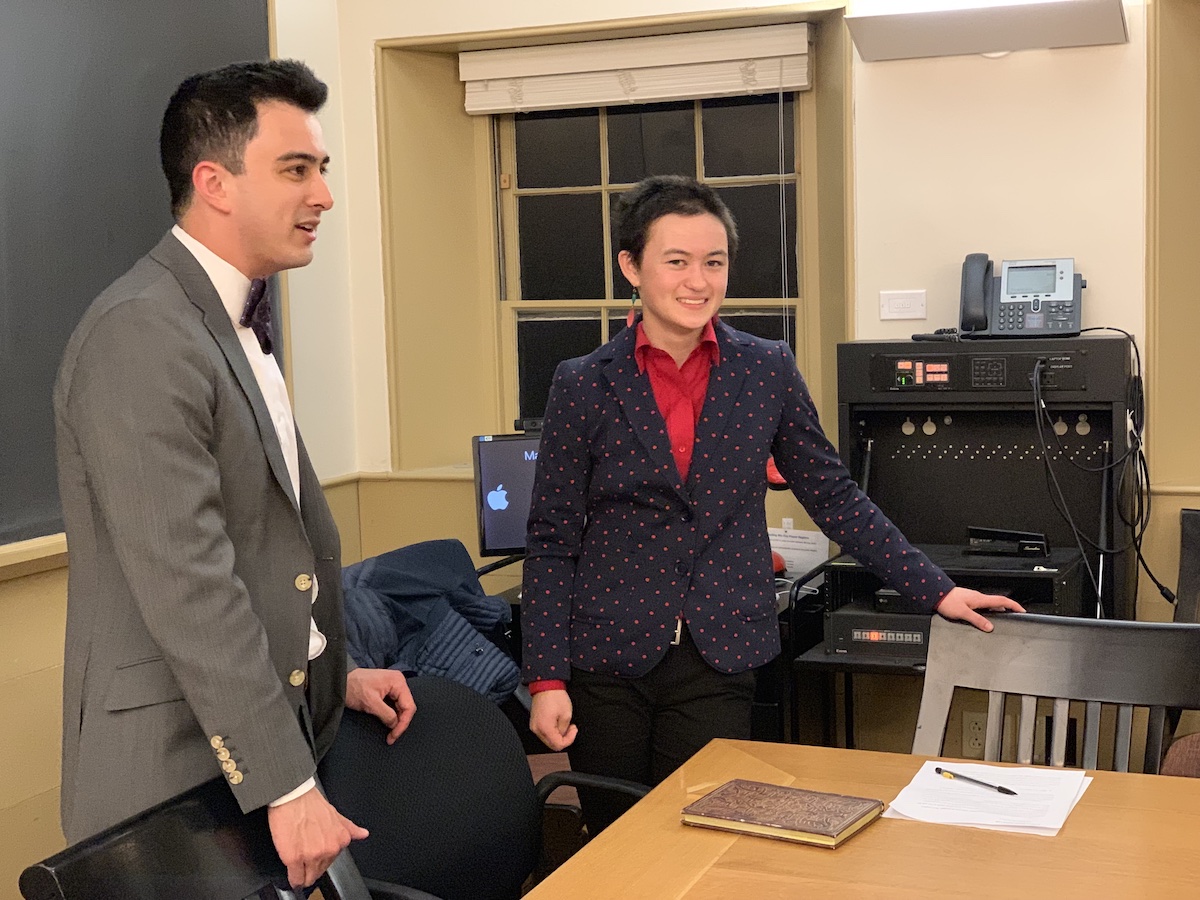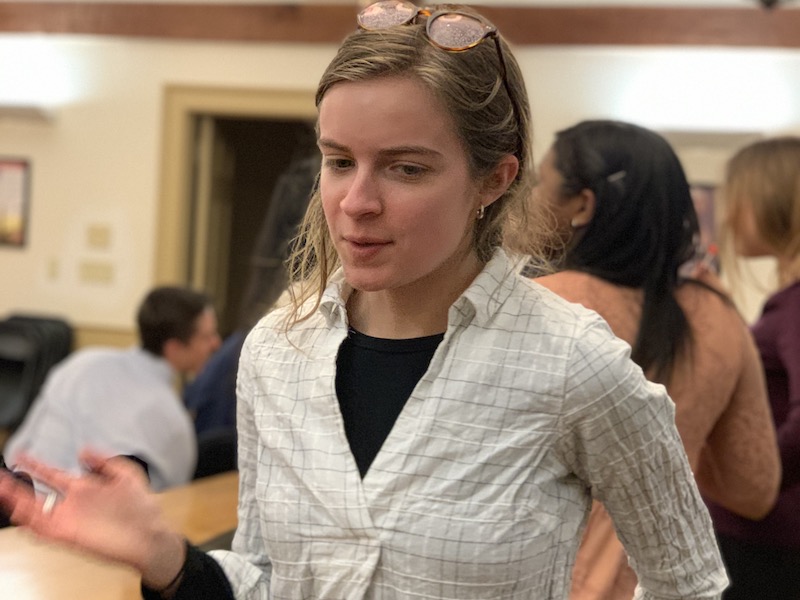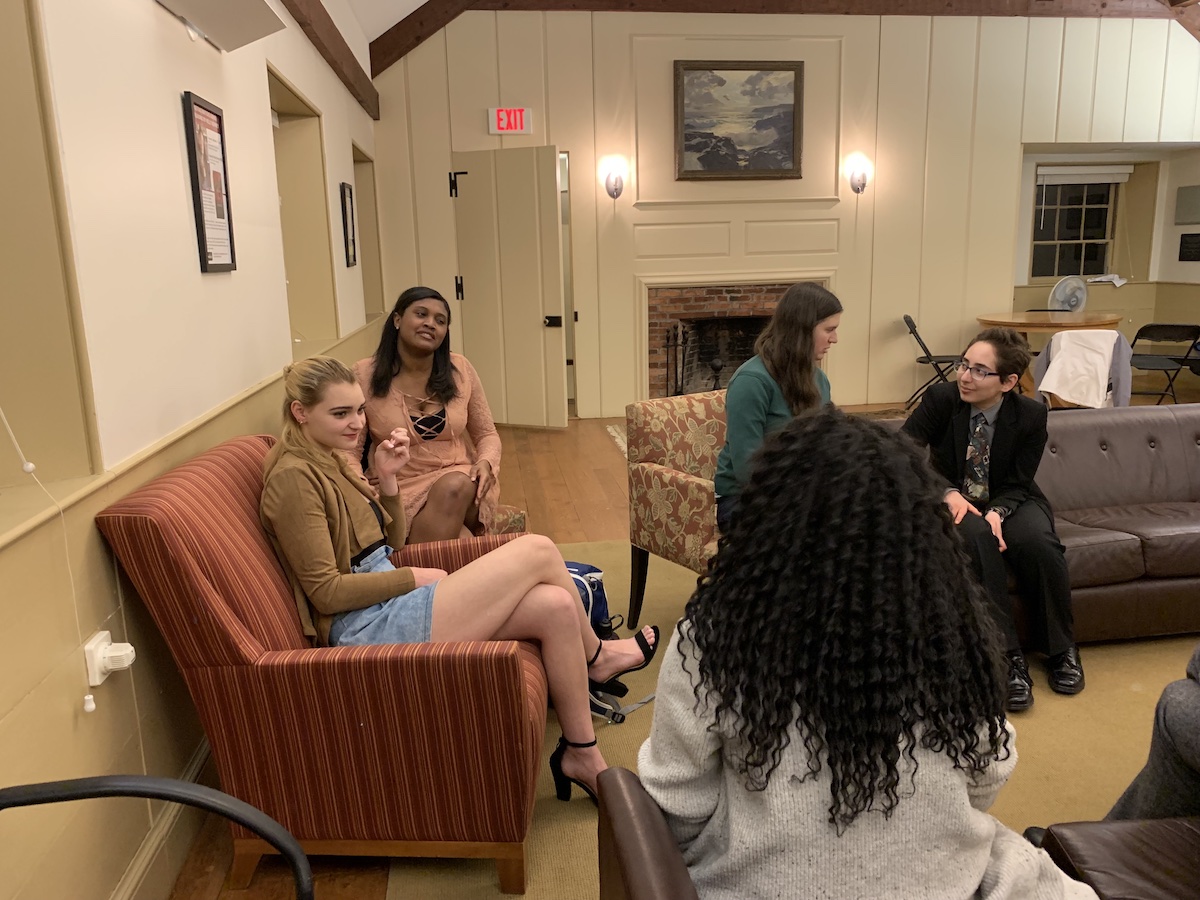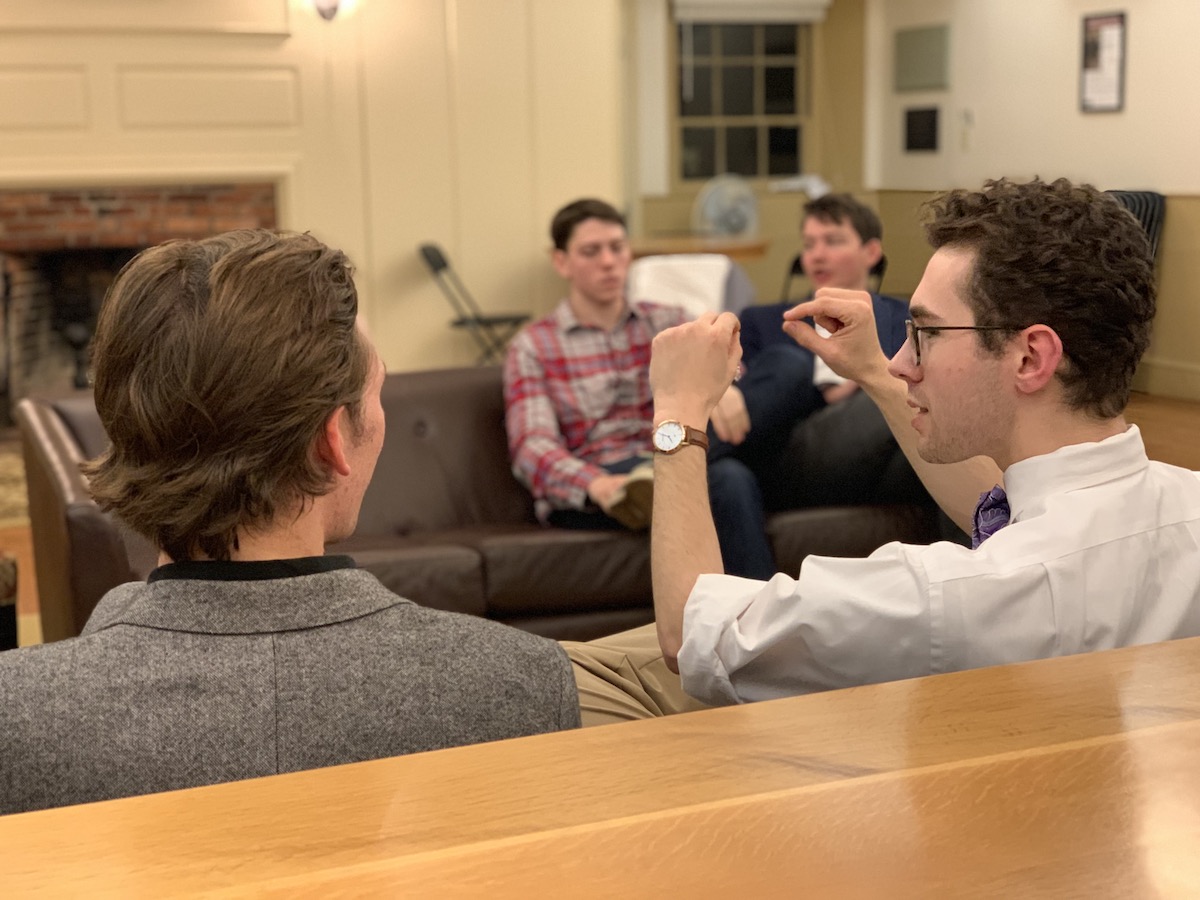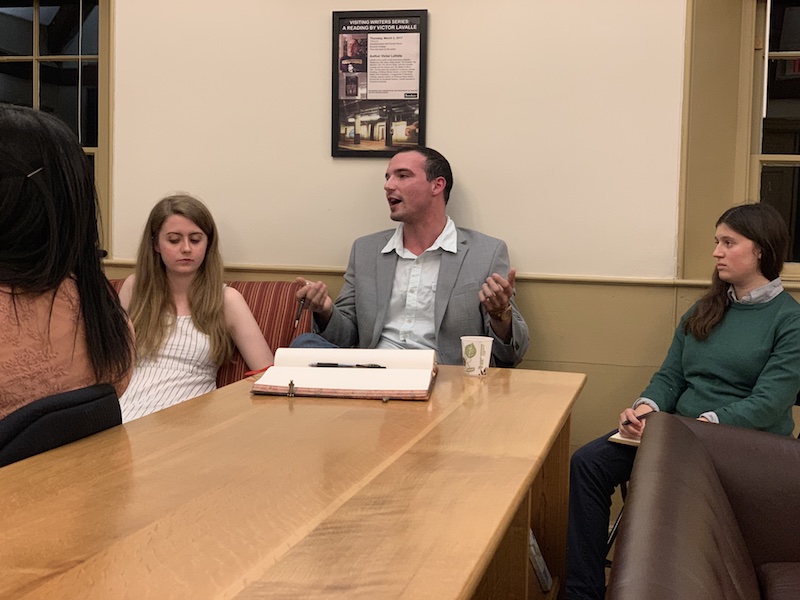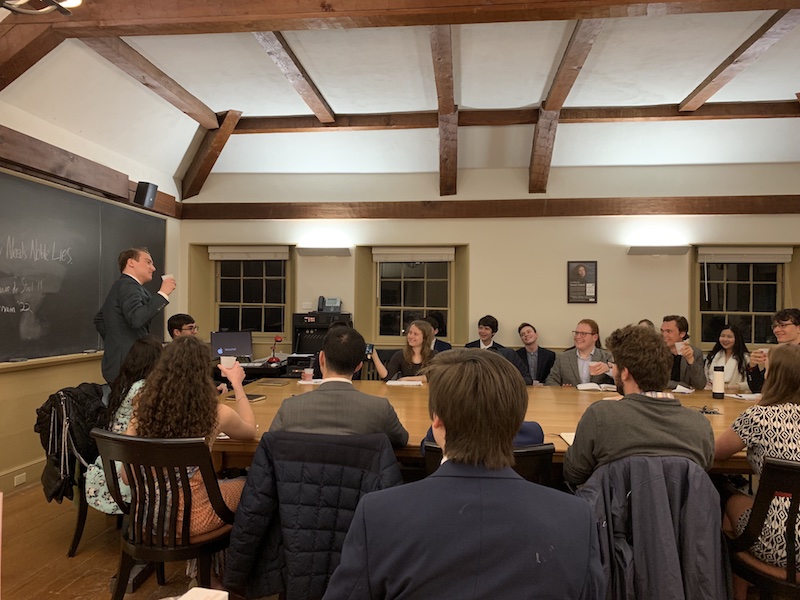The Peucinian Society: Clashing Ideas While Staying Friends
By Rebecca GoldfineBowdoin's oldest student organization is dedicated to the investigation of philosophical inquiries, moral questions, and what it means to live a good life.
For three hours every Thursday night, the Peucinian Society—a close-knit community of students with a serious philosophical bent—gathers in Massachusetts Hall to discuss some of the thorniest issues of our time, as well as revisit milllennia-old questions.
The topics they choose cover a lot of ground, from relatively abstract theoretical queries to contemporary dilemmas. Here are a few recent examples: Is shame a force for good in society? Are gender roles, or is the institution of marriage, beneficial to society? Does the belief in a soul enrich our lives? Is social media destroying democracy? The Society keeps a record of all its disputation topics.
"One of the most valuable things about Peucinian and why I love it," longtime Peucinian member and outgoing provost Mikayla Kifer ’19 said, "is that it's a group of people who come together to spend three hours discussing these things and asking questions you wouldn't ask anywhere else. There is no nerd shaming! You get access to people who are excited about whatever the topic is."
In recent years, the club has made strides to attract a mix of students from different backgrounds and with different views. For the best way to arrive at truth, the Peucinians say, is to hear from as many voices as possible.
Celebrating free inquiry
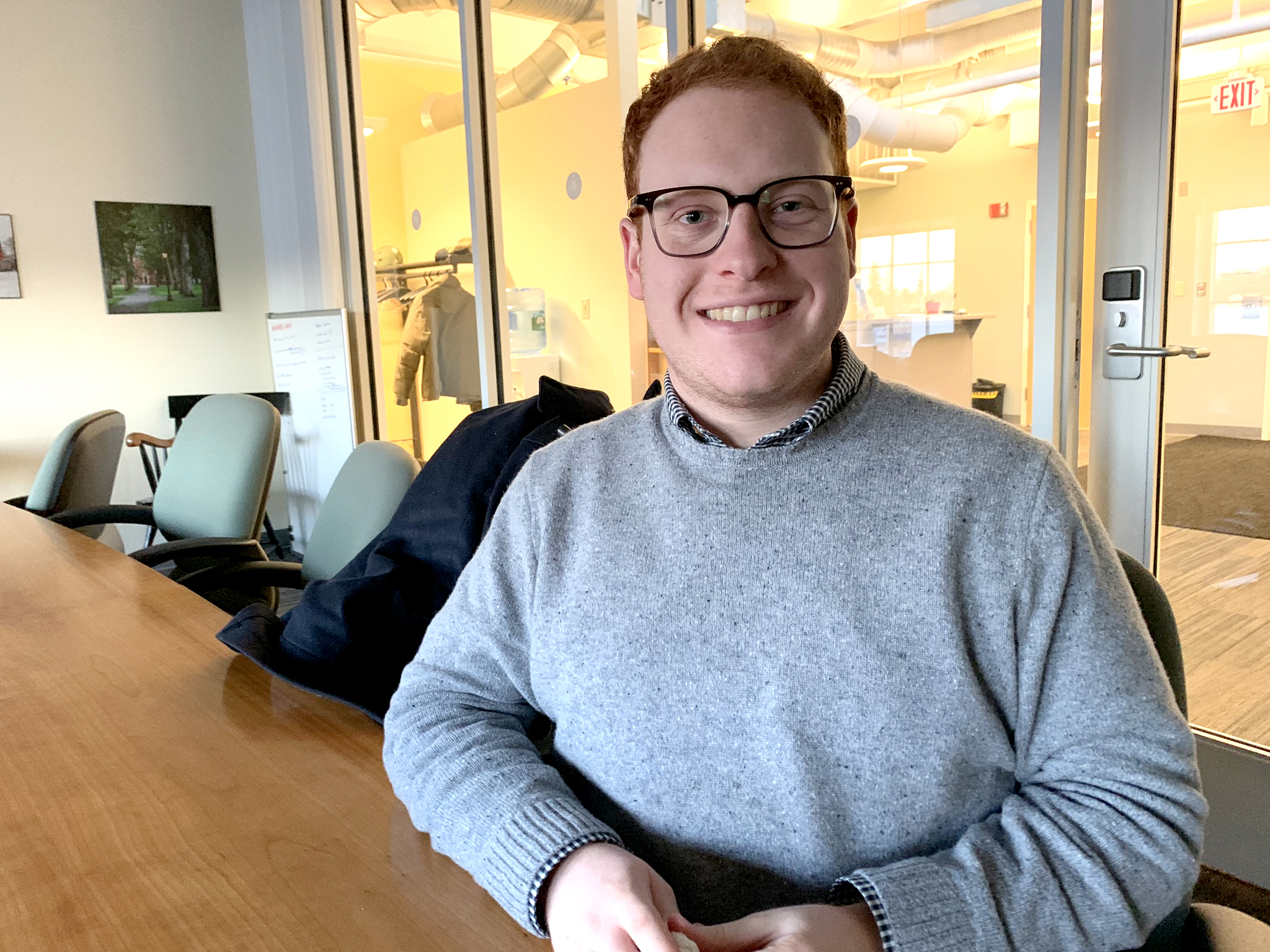
"One of the things I am really passionate about is the clashing of opposing ideas," said Sam Lewis ’19, who recently served as the Society's president. The Peucinian Society fosters an environment in which students "do not just tolerate but actually seek out opposing views," he continued. "Our members hold a diversity of political views, but they are united in desiring to hear ideas they find challenging or wrong."
Yet "clashing" does not quite conjure up what happens at a Peucinian debate, or rather, a "disputation." There is no red-faced arguing or accusatory finger wagging. Rather, the club's members try to uphold the society's foundational principles—to promote a culture of respect and free inquiry that kindles strong friendships.
A respectful environment is critical for encouraging people with different perspectives to come to the table and participate, according to the club's more senior members. In turn, attracting people with a mix of views and beliefs leads to a discussion that can better illuminate the depths and ambiguities of almost every social, political, and cultural issue the Peucinian Society debates.
"The Peucinian Society has gotten me to appreciate the complexity of any topic you can think of," outgoing Peucinian Master of Sessions Ben Ratner ’19 said, and to "realize there are voices out there that you are probably not hearing that could change the way you think about something."
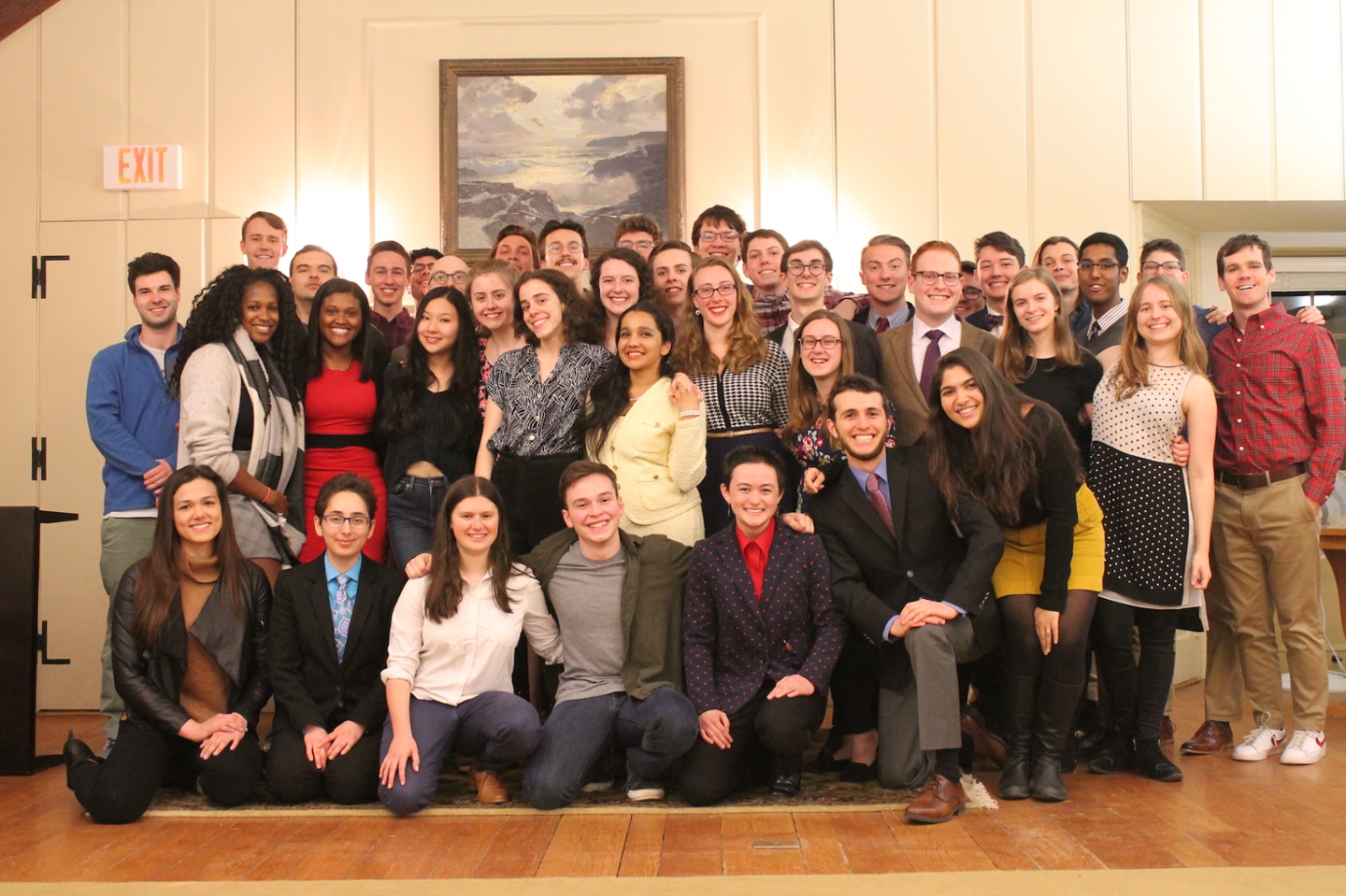
“The Society maintains an environment that nourishes utmost respect, enables lasting friendships and, above all, celebrates free inquiry.”
——Peucinian Society mission
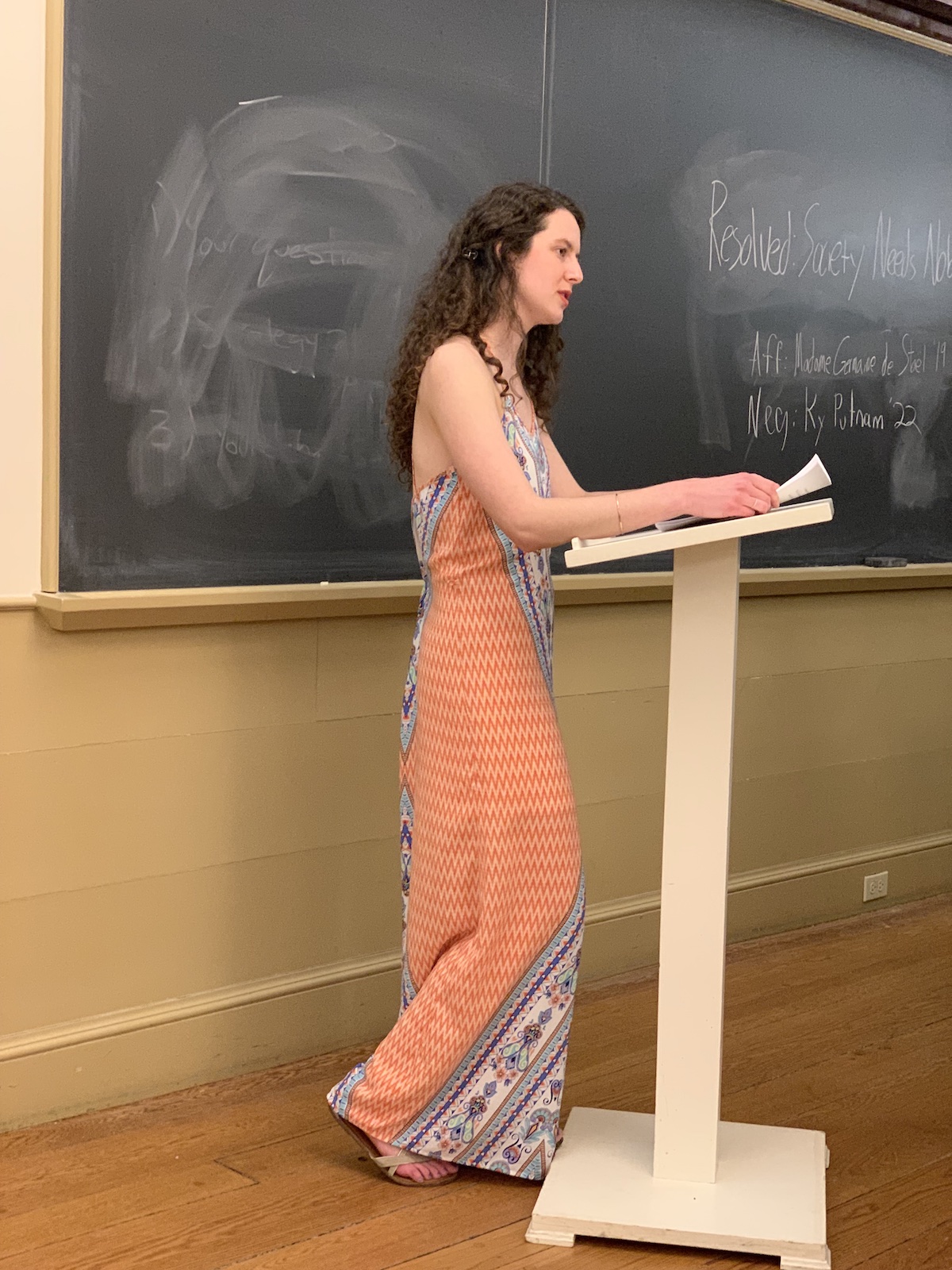
Nourishing utmost respect
The Peucinian Society was founded at Bowdoin in 1805, but slipped into dormancy at the turn of the twentieth century before being revived by a few students in 2007. Being the oldest student club, the Society is steeped in traditions. How necessary these are to maintaining its mission and its character versus how much they reinforce an aura of elitism and exclusivity is a fairly regular topic of conversation among its members.
"The Peucinian Society is very self-reflective," Kifer said. "I personally am always pushing that we have a welcoming environment. Some people think that has to come by sacrificing some of of our traditions," such as, she added, the semi-formal dress code. There are members who see setting standards for attire as not conducive to making everyone feel comfortable. But others view it as essential to the Peucinian Society and elevating the discourse from the everyday into something special.
The job of cultivating inclusion within the Society, while a group undertaking, is one of the duties of the provost, a position most recently occupied by Kifer. (The other official duties are to uphold decorum and respect among members.) "The role of provost has become more important over the years because we care about having ideological diversity," she said.
Shani Agarwal ’20 is the club's newly elected provost, and sees her job as "walking the line between holding up some of our treasured traditions" while "improving the society and evolving and making those traditions and etiquette more accessible to newcomers."
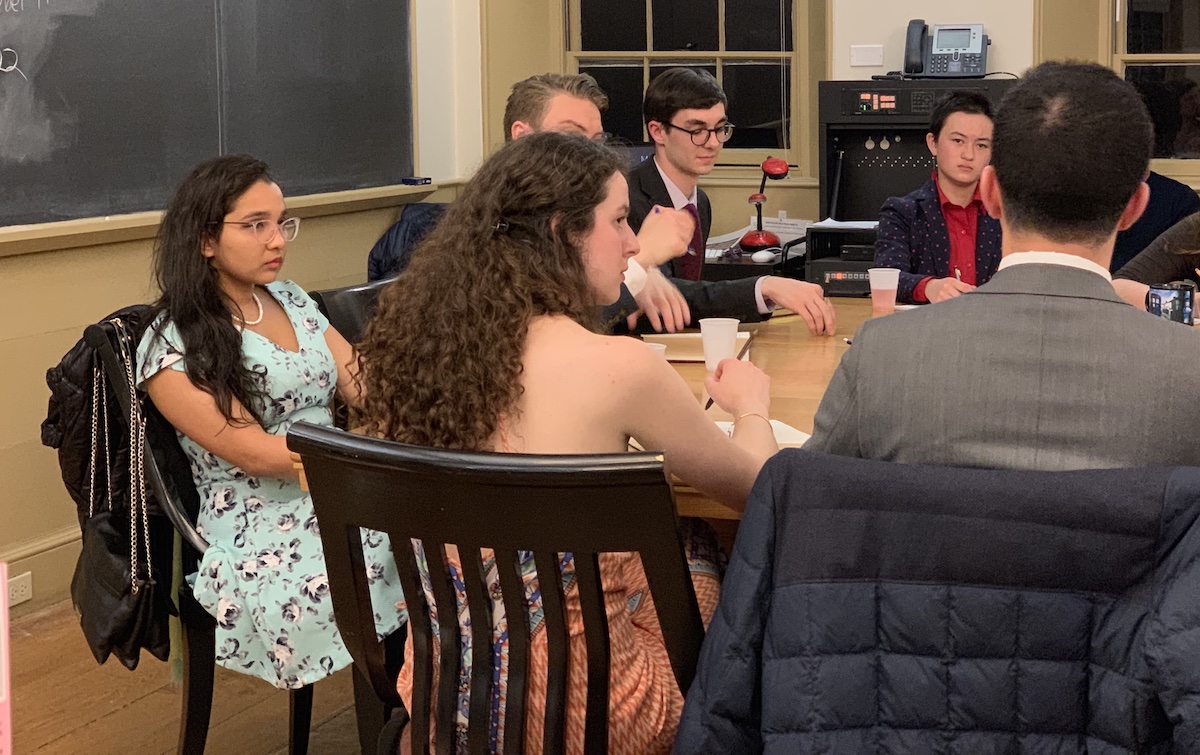
Another debate targets the disputations themselves—whether they should be more clashing and oppositional, or if they should be slightly less so, which could draw in quieter students who haven't come from a debating background. Additionally, some question the value of using personal experiences to bolster arguments, while others see them as often inseparable from the ideas being discussed.
Nicole Yip ’22, a first-year Peucinian member, said that that the issue with always "arguing in the abstract, and looking down on personal anecdotes and appeals to emotion," is that this "ignores the fact that our ability to only think theoretically comes from the privilege that many around the table have. It allows us to be able to remove ourselves from the important impacts that the things we discuss have."
Today, as it has been for a few years, the group's roster is approximately half women and half men, and its students study an array of majors, from the humanities to the physical sciences. While the society is still predominantly white, the Peucinians say their club has become more diverse in the last few years and that they're striving to make it even more so.
Rob Sobak, an associate professor of classics and a Peucinian advisor, said he's encouraged by the Peucinians thinking broadly about their place in the College, and about how they can become a more welcoming and inclusive organization. "Much work remains to be done," he added, "and hopefully the incoming leadership will build upon what the class of 2019 and others have begun."
Enabling lasting friendship
One of the strategies the club uses to foster a culture of sharply intellectual yet courteous debate is making good on one of the Society's original promises—enabling friendships.
"Peucinian is a place where people know that if they have intense leftist, Marxist views, or strong conservative views, people will debate with them on the merits of their arguments and then go to SuperSnack and enjoy each other's company," Lewis said. "We can't have the trust necessary for serious intellectual engagement and learning if we're not treating each other well."
Students also say that establishing a tolerant community built on intellectual exploration requires lifting people out of confining categories, such as from the Democrat vs. Republican divide. "We realize that people are more than just conservatives and liberals," Ratner said. "There are deeper values and deeper principles they hold that actually get us closer to mutual understanding and truth."
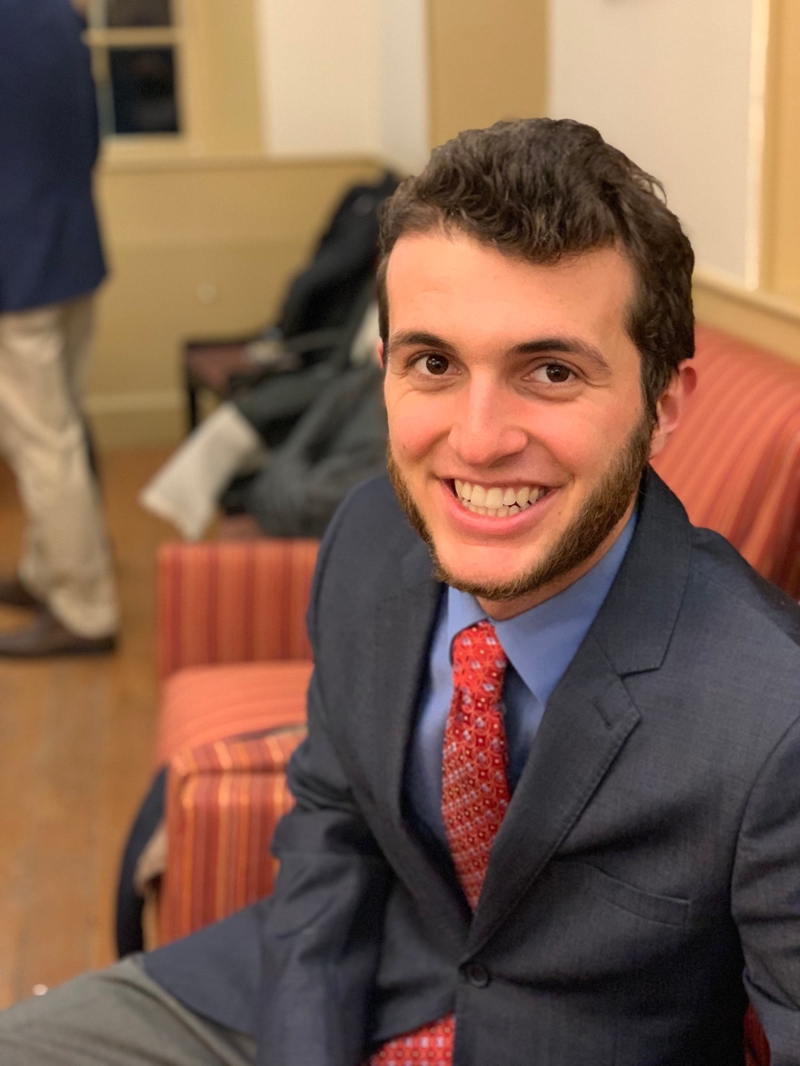
Agarwal said she's never felt tokenized in the Society, or that her comments are expected to reflect her foreign perspective. She grew up in India. "Out of all the places on campus, this is one of the few where I haven't been actively reminded of that status," she said. "At Peucinian, I have really felt that people want to get to know me for my beliefs and my ideas and the way I can shape the conversation around the table. It's never been about, 'what's the foreign angle on this?'"
Yip, who is from Hong Kong, said the nature and focus of the disputations encourage students to speak "from the heart," (where, really, what is shared among all people often dwells), and they they "revolve around the greater question of how to live the good life," another universal preoccupation. "I've become so comfortable with and trusting of everyone in the Society and of the space that we have created that I do not feel the need to either forget my identity—because of how it differs from many others—or emphasize it," she added.
While the Peucinian Society appears to have created a successful forum for the wrestling of diametric opinions, its success takes time and commitment. The council of leaders meets weekly to plan future disputations. The weekly disputations themselves last three hours, and students often continue the conversation well into the morning.
"You have time to dig in," Kifer said. "So even if I hear a perspective that initially seems off-putting, I can see that it fits in with the rest of you, and I know you're a compassionate person, and I trust you."
The disputation code
I. Introductions
A three-hour disputation follows a well-established protocol. After gathering at around 8:15 p.m. to mingle over snacks and drinks, the students settle into their seats around a large table in the third floor seminar room of Massachusetts Hall at 8:30 p.m.
The President makes an introduction and a poem is read by the Poet Laureate. Then, two preselected speakers present prepared statements for and against that week's question, or, "the resolved statement."
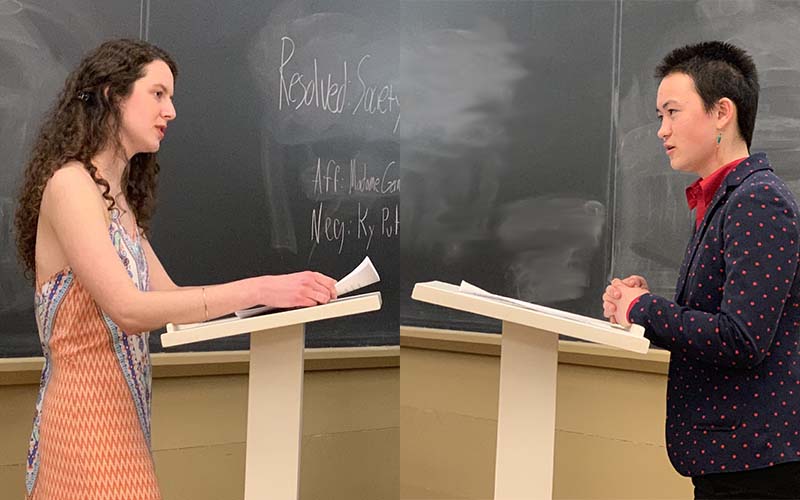
II. The orations
On a recent Thursday evening, Kifer began her oration: "Our society needs noble lies, and I am here to tell you why." Plato conceived of noble lies as falsehoods knowingly propagated by an elite to maintain social harmony, such as, Kifer pointed out, "if you work hard enough you can achieve your dreams."
Ky Putnam ’22 followed with an oration on the harms of propagating noble lies. Following Putnam's remarks, the president—newly elected Zack Coddington ’20—opened up the floor for five minutes of clarifying questions.
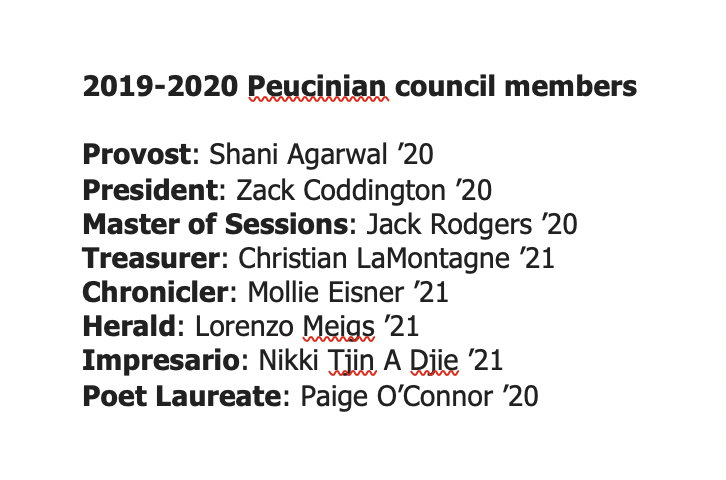
III. Disputation
An hour of discussion followed, with students offering insights and questions to clarify what a noble lie was, who should be disseminating noble lies, and whether they harm or help a society. The Peucinians do not permit students to raise their hands to speak until the one who has the floor is finished. And all who attend the meetings are encouraged to speak, although sitting quietly and listening is fine, as well.
The president decides who can contribute a comment and whether someone can offer a rebuttal. In this way, the discussion proceeds in a contemplative, mannerly way, with an attentive president working to prevent personalized disagreements from disrupting the flow.
In his new role as president, Coddington said, "Around the table, I must ensure the conversation around the table fully explores its potential, and that comments are responsive to each other." The president also, he added, helps organize non-disputational events, both social and intellectual. "I owe it to all the Peucinians of the past and future that our community and traditions continue to flourish," he said.
IV. Peripatos
Halfway through, the debate is paused for the Peucinian ritual of "peripatos," a stroll around the quad, preferably in the company of a student with whom one disagrees or doesn't know well. When students return, they launch the next hour of disputation, which, according to seasoned Peucinians, is often more incisive and exciting after members have had the chance to organize their thoughts in the fresh air.
V. The vote and the question
Perhaps the most important moment comes at the end of the night. Approaching midnight, each attendee is asked to vote in the affirmative or negative on the resolution. Students accompany their votes with a question. At the noble lies disputation, Ratner asked whether idealism requires deception. Kifer wondered what's so wrong with lying.
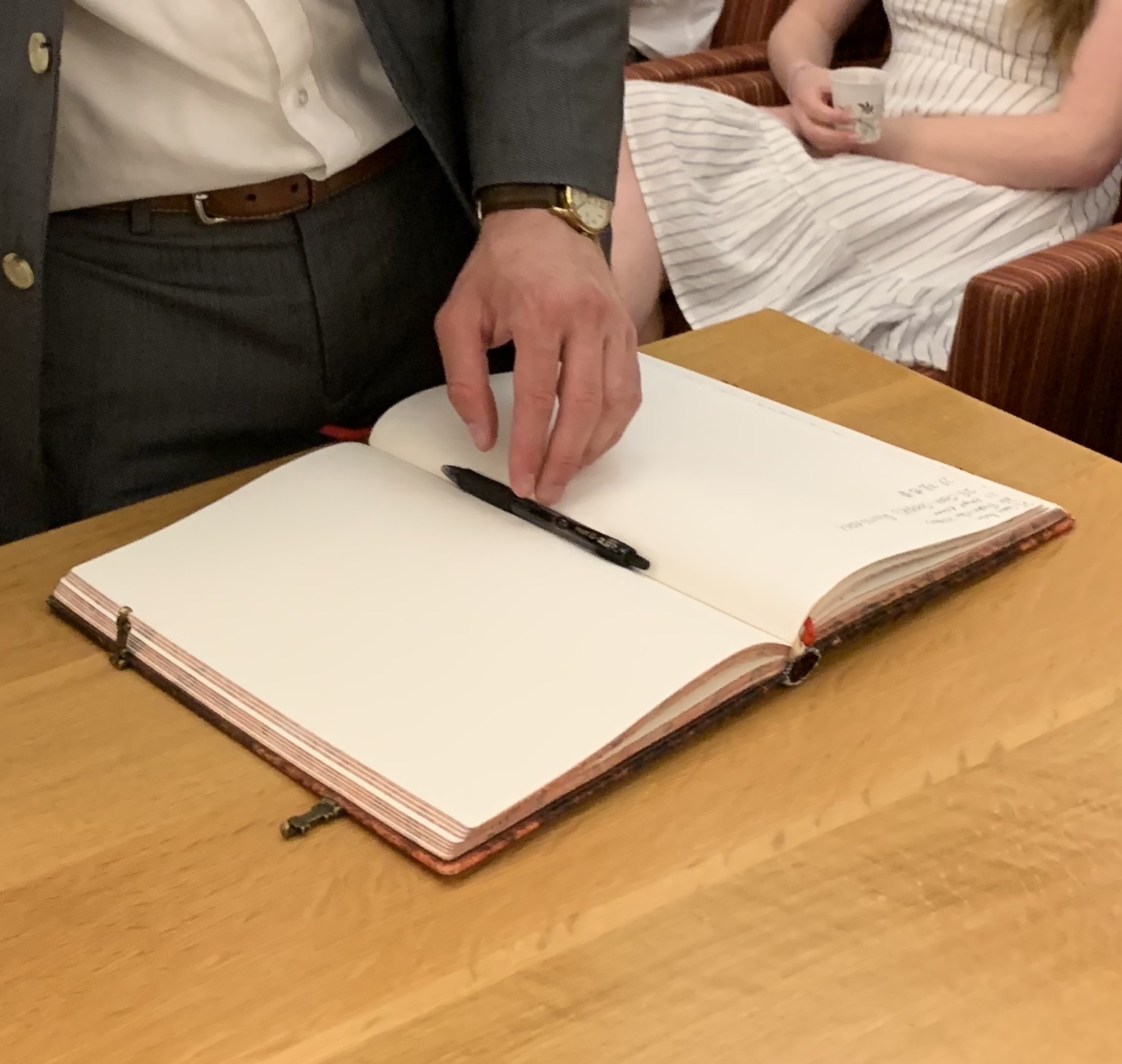
The final vote is part of the Peucinian mission to help students come to conclusions, and to follow through on those convictions. "I think there is a blending between the contemplative and the active," Lewis said. "We come to Peucinian to think ideas through, but when we leave Peucinian we have to live our lives, and we have to make choices."
Critical to this process is being open to changing one's mind if presented with compelling testimony. "One of the most important things about being in Peucinian is being willing to question beliefs you hold very deeply," Kifer said.
Kifer then extended an invitation to the larger Bowdoin student body to consider dropping by for a disputation to check it out. "What we offer is something that many, many, many Bowdoin students would appreciate," she said. "It would be a good space for them, and it would be good for us to have them. We're a community of people who are excited about learning and talking and being together in that excitement."
